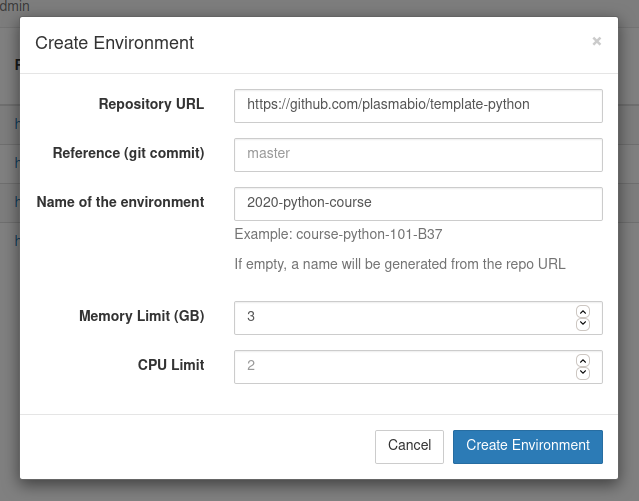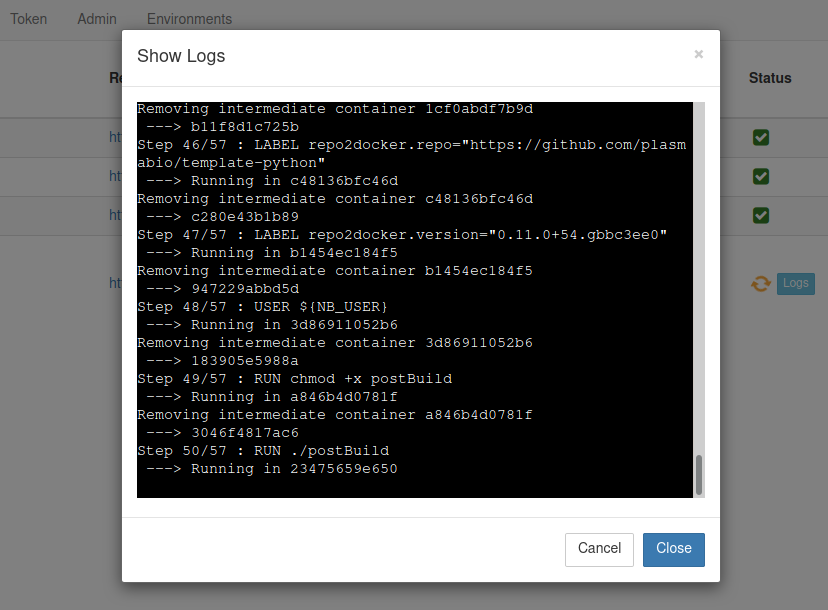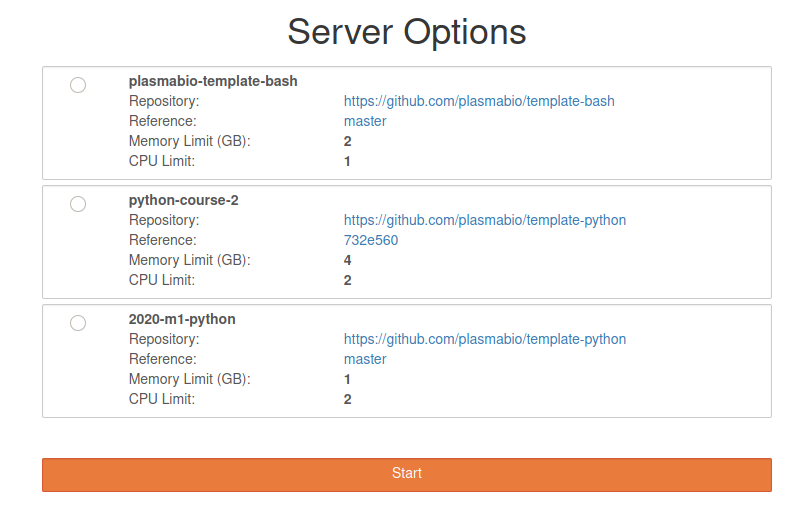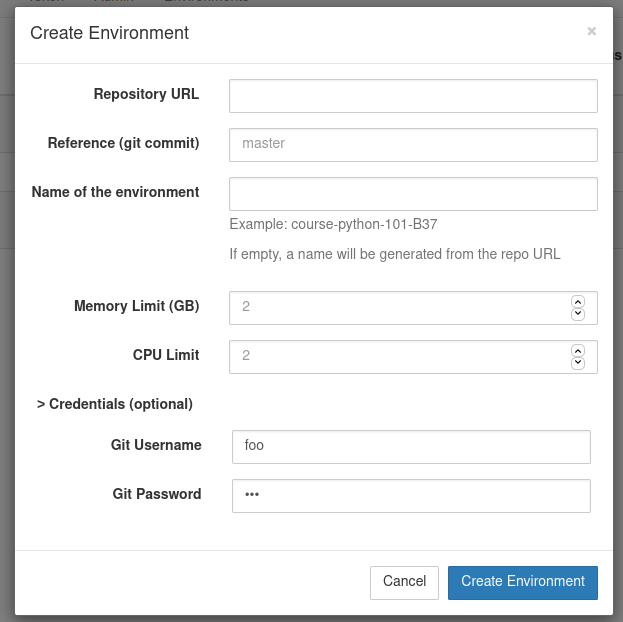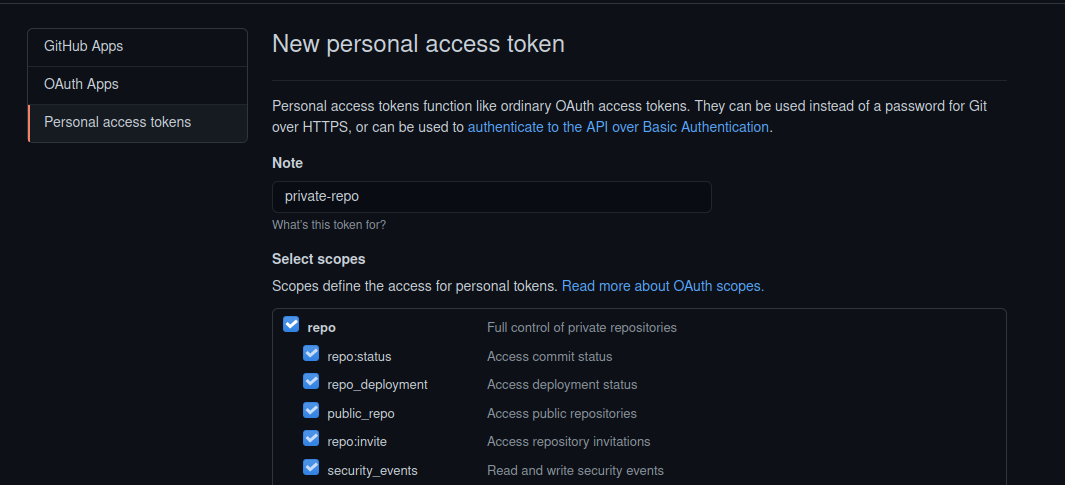No project description provided
Project description
tljh-repo2docker
TLJH plugin to build and use Docker images as user environments. The Docker images are built using repo2docker.
Installation
During the TLJH installation process, use the following post-installation script:
#!/bin/bash
# install Docker
sudo apt update && sudo apt install -y apt-transport-https ca-certificates curl software-properties-common
curl -fsSL https://download.docker.com/linux/ubuntu/gpg | sudo apt-key add -
sudo add-apt-repository -y "deb [arch=amd64] https://download.docker.com/linux/ubuntu bionic stable"
sudo apt update && sudo apt install -y docker-ce
# pull the repo2docker image
sudo docker pull quay.io/jupyterhub/repo2docker:main
# install TLJH
curl https://raw.githubusercontent.com/jupyterhub/the-littlest-jupyterhub/master/bootstrap/bootstrap.py \
| sudo python3 - \
--admin test:test \
--plugin git+https://github.com/plasmabio/tljh-repo2docker@master
Refer to The Littlest JupyterHub documentation for more info on installing TLJH plugins.
Usage
List the environments
The Environments page shows the list of built environments, as well as the ones currently being built:
Add a new environment
Just like on Binder, new environments can be added by clicking on the Add New button and providing a URL to the repository. Optional names, memory, and CPU limits can also be set for the environment:
Follow the build logs
Clicking on the Logs button will open a new dialog with the build logs:
Select an environment
Once ready, the environments can be selected from the JupyterHub spawn page:
Private Repositories
tljh-repo2docker also supports building environments from private repositories.
It is possible to provide the username and password in the Credentials section of the form:
On GitHub and GitLab, a user might have to first create an access token with read access to use as the password:
Extra documentation
tljh-repo2docker is currently developed as part of the Plasma project.
See the Plasma documentation on user environments for more info.
Building JupyterHub-ready images
See: https://repo2docker.readthedocs.io/en/latest/howto/jupyterhub_images.html
Run Locally
Check out the instructions in CONTRIBUTING.md to setup a local environment.
Project details
Release history Release notifications | RSS feed
Download files
Download the file for your platform. If you're not sure which to choose, learn more about installing packages.
Source Distribution
Built Distribution
File details
Details for the file tljh_repo2docker-1.0.1.tar.gz.
File metadata
- Download URL: tljh_repo2docker-1.0.1.tar.gz
- Upload date:
- Size: 72.1 kB
- Tags: Source
- Uploaded using Trusted Publishing? Yes
- Uploaded via: twine/5.0.0 CPython/3.11.8
File hashes
| Algorithm | Hash digest | |
|---|---|---|
| SHA256 | 00beffd4b8131887b728c60046e549ea4bf5993d67b4a9fb71c56b05c973c7e4 |
|
| MD5 | b400050872cbfe17d7fbdaf5ca2343d2 |
|
| BLAKE2b-256 | 5af4949ca97a1f3f62f19c721ebfb4050318ca9920b94f2811aa12b6b9308f4e |
File details
Details for the file tljh_repo2docker-1.0.1-py2.py3-none-any.whl.
File metadata
- Download URL: tljh_repo2docker-1.0.1-py2.py3-none-any.whl
- Upload date:
- Size: 79.5 kB
- Tags: Python 2, Python 3
- Uploaded using Trusted Publishing? Yes
- Uploaded via: twine/5.0.0 CPython/3.11.8
File hashes
| Algorithm | Hash digest | |
|---|---|---|
| SHA256 | 7e76fe1d84e76867794915ec4c523ea7107dddb1e062708470b508f98fd9f0c6 |
|
| MD5 | ed2eaa61a42fdd697ce6e00ec23575bd |
|
| BLAKE2b-256 | 7132aa80c9bb8913a98f0e574a1f6868f5e9316a541e36664e85d5611b9c540d |





